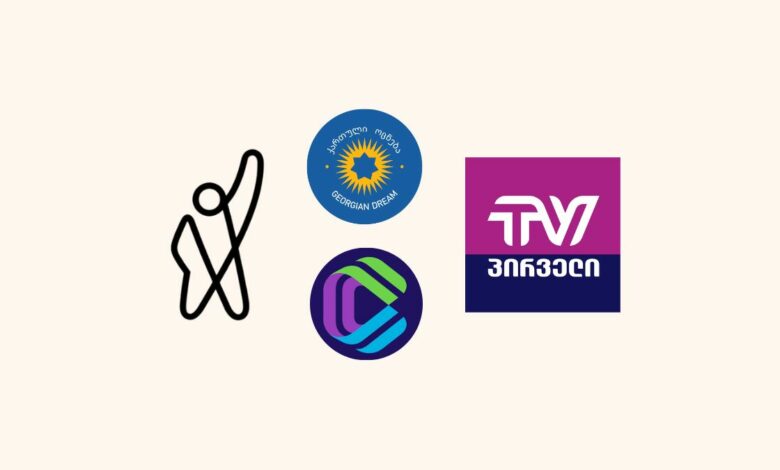
Georgian Dream Targets Critical Broadcasters for Questioning Government Legitimacy
The ruling Georgian Dream party filed complaints with Georgia’s media regulator, the Communications Commission, against the two largest opposition-leaning channels, Formula and TV Pirveli, for using in the coverage terminology questioning the GD government’s legitimacy, among others.
The complaints follow recent amendments by the one-party parliament to the Law on Broadcasting, which granted the Commission broader powers to apply stricter regulations to broadcasters’ content according to what GD claims is the “British model”. Critics have argued that the law, which allows for sanctions from fines to suspension/cancellation of broadcasting license, is intended to “eliminate” critical media in the country.
“Straight out of Orwell’s book,” Salome Zurabishvili, Georgia’s fifth president, said about what she described in a June 3 briefing as “attempts to control your every word in media and to start banning words.” Zurabishvili called the move “the beginning of a new wave of repression,” saying it “shows a sign of weakness of this government.”
Mtavari Arkhi, a TV channel that went off air on May 1 due to financial problems and now operates only on social media, also reported receiving a similar complaint.
The complaint against Formula, seen by Civil.ge, cites the channel’s journalists and anchors using language the ruling party claims violates the law. Among the phrases flagged are:
- “regime’s prisoner,” referring to the anticipated detention of opposition politician Zurab Japaridze on the morning of his court hearing on May 22;
- “illegitimate parliament” and “so-called investigative commission,” referring to Georgian Dream’s one-party legislature and its temporary investigative commission probing alleged UNM-era crimes;
- “so-called speaker of the parliament,” referring to Shalva Papuashvili, and “so-called chair of the investigative commission,” referring to Tea Tsulukiani;
- “blacklisted by Georgian Dream,” referring to British journalist Will Neal, who was denied entry to Georgia;
- “oligarch’s business partner”, referring to GD founder Bidzina Ivanishvili as an oligarch;
- “Georgian Dream’s Interior Minister,” referring to then–GD Interior Minister Vakhtang Gomelauri, who later resigned;
- “the regime’s leader Bidzina Ivanishvili”;
- “propaganda pillar TV channel,” referring to pro-government Imedi TV;
- “oligarch’s deputy,” referring to GD MP Ilia Injia;
- “regime’s representatives”;
- “pro-Russian political regime”;
- “politically motivated attack,” referring to an incident involving an opposition politician on May 25.
“These are personal assessments and accusations, which are not separated from facts,” the document says, reminding the broadcaster that it “should ensure respect for fairness and the principle of impartiality when reporting news.”
Additionally, the complaint cites a social media post by Formula in which the channel refers to Irakli Kobakhidze as “the regime’s prime minister” or simply “Kobakhidze.” It again criticizes what the appeal says are “personal assessments” in news reporting, emphasizing the importance of distancing them from facts.
The complaint against TV Pirveli likely follows the line of the complaint against Formula. The disputed phrases, according to an excerpt from the appeal document shared by the channel’s lawyer, Tornike Migineishvili, include:
“illegitimate government,” “regime,” “capture,” “oligarch’s regime,” “pro-Russian regime’s deputy,” “threatening with imprisonment,” “de facto parliament’s deputy,” “…uses mandate for punishment,” “clan’s judiciary,” “the session of the Russian commission,” likely referring to GD’s parliamentary investigative commission, “the conditions of oligarch’s regime,” “repressive,” etc.
Georgian Dream Prime Minister and Party Chair Irakli Kobakhidze has appointed Natia Bokuchava to represent the ruling party’s interests in the Communications Commission, which is widely believed to be under the party’s influence.
“This is the beginning of a new series of repression against critical media,” said Tornike Migineishvili, TV Pirveli’s lawyer. He added that the Communications Commission will start reviewing the complaint on Thursday, June 5.
Should the Commission share Georgian Dream’s arguments, it can apply sanctions against TV channels ranging in severity. Punitive measures include issuing an oral or written warning, demanding corrective action from the broadcaster, such as issuing an apology or removing the report, imposing a fine, or placing temporary restrictions, which may include an order to stop using certain terminology. In extreme cases, it may suspend or revoke the station’s license.
Media Advocacy Coalition, a group of media-focused civil society organizations, responded on June 3 to the complaints against Formula and TV Pirveli, calling them “legal repression” by Georgian Dream. The statement also cited a European Parliament resolution recommending Communications Commission head Kakha Bekauri for sanctions as part of Bidzina Ivanishvili’s network of enablers.
Formula and TV Pirveli remain the two largest opposition-leaning TV channels in Georgia, following the closure of TV Mtavari due to financial difficulties.
Complaints against TV channels come amid broader concerns about a legislative crackdown on the media, including through two foreign agent laws: the 2024 Law on Transparency of Foreign Influence and the 2025 Foreign Agents Registration Act (FARA). Recent amendments to the Law on Grants and the Law on Broadcasting have introduced further restrictions on receiving foreign funding for online and broadcasting media.
“This is censorship aimed at ending media that is already in dire financial condition,” Vakho Sanaia, Formula’s evening news anchor, said on air.
Note: the article was updated on June 5 to include Mtavari Arkhi’s report about receiving a similar complaint.
Also Read:
- 31/05/2025 – Georgian Dream’s FARA Takes Effect
- 01/04/2025 – GD Rubber Stamps FARA, Broadcasting Law Changes, Revives Treason, Removes Gender, Excludes CSOs
This post is also available in: ქართული